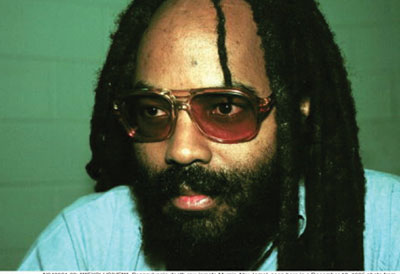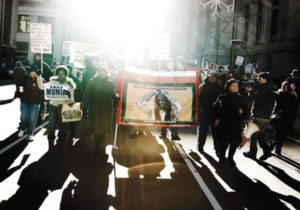
By NewsOne Staff
(Source NewsOne):

Former Black Panther Mumia Abu-Jamal was convicted of killing a white Philadelphia police officer nearly 40 years ago. Born Wesley Cook, the activist and journalist was driving in his taxi in Philadelphia just before 4 a.m. on Dec. 9, 1981, when police officer Daniel Faulkner conducted a traffic stop of a light blue Volkswagen. His brother, William “Billy” Cook, was the driver. Abu-Jamal, parked just across the street, approached the scene. Within minutes he had been shot in the chest and Faulkner had been shot dead. Abu-Jamal was arrested as the accused perpetrator.
The details of precisely how those fateful minutes un-folded remain one of the most debated accounts in recent case history. However, since his conviction in 1982, there has been enough evidence stacking on the side of those who maintain Abu-Jamal’s innocence that entire books, movies, and fashions have been dedicated to the Free Mumia cause.
Free-agent NFL quarterback and social justice activist Colin Kaepernick on Monday joined the decades-long calls for Abu-Jamal’s freedom.
“We’re in the midst of a movement that says Black Lives Matter. If that is the case, then Mumia’s life and freedom must matter,” Kaepernick said during a pre-recorded video statement alongside groups that included Black Lives Matter Philadelphia, Mobilization 4 Mumia and the Black Philly Radical Collective. “Even while living in the hells of the prison system, Mumia still fights for our human rights. We must continue to fight for him and his human rights.”
Five top reasons for his innocence are:
Faulty Evidence
- There was never a “blow-back” test conducted to show gun residue on Abu-Jamal, and the original medical examiner’s report, which not seen by the 1982 jury that convicted him, stated that the fatal bullet was a .44 caliber. A police ballistician reported that the bullet was actually a .38 caliber. Abu-Jamal was said to have been carrying a legally registered .38 caliber Charter Arms revolver.
- Pedro P. Polakoff, a Philadelphia freelance photographer who reports he arrived at least 10 minutes before the arrival of the Mo-bile Crime Detection Unit, took photos that show that officer James Forbes was handling the guns retrieved from the crime scene with his bare hands, which is not the appropriate protocol.
- At the time of the trial the police and the District Attorney’s office failed to notify Abu-Jamal’s defense about a driver’s license application for Arnold Howard found in the front pocket of Officer Faulkner’s shirt, which may prove that a fourth person was involved. Later Howard said that he loaned his temporary, non-license ID to Kenneth Freeman, a business associate of Billy Cook, whom Cook said confessed. Freeman was found dead in 1985, reportedly naked and gagged.
Witness Tampering
- After the 1982 trial, Veronica Jones, a police informant who was working as a prostitute at the crime scene, revealed that police had coerced her and Cynthia White, another informant who was called as a witness to testify to Abu-Jamal’s guilt. A third woman, Yvette Williams, submitted an affidavit in 2002 declaring that while she was in jail with White, White told her about the coercion.
Official Corruption
- In the late 90’s, an investigation of the Philadelphia Police Department exposed many corrupt officers who violated civil rights and stole from suspects. Nearly 1,400 cases were reviewed and more than 100 people released. One of the officers investigated agreed that he and his girlfriend would cooperate in further efforts. His girlfriend was Pamela Jenkins, the informant who said she was coerced into testifying to Abu-Jamal’s guilt.


Be the first to comment